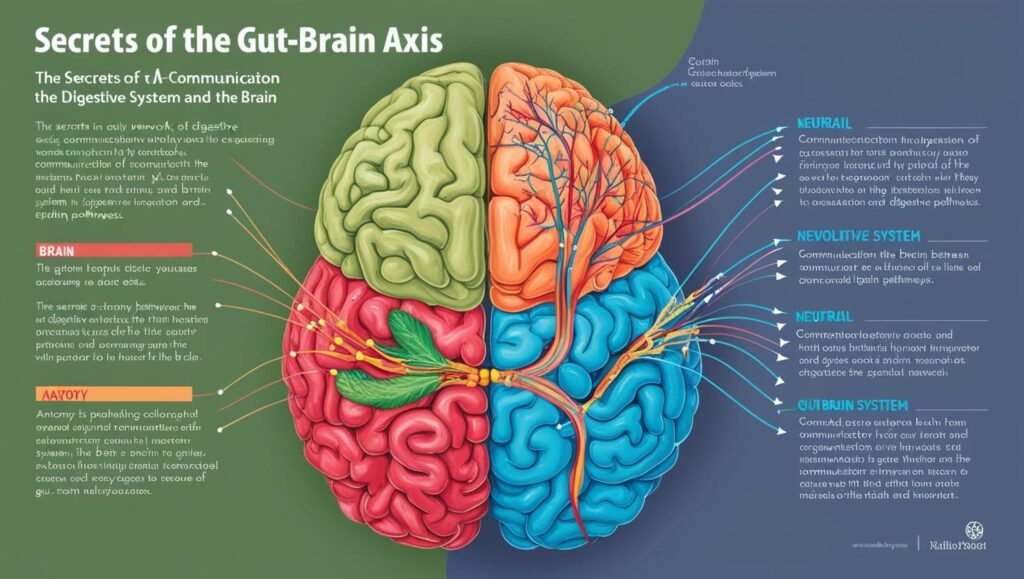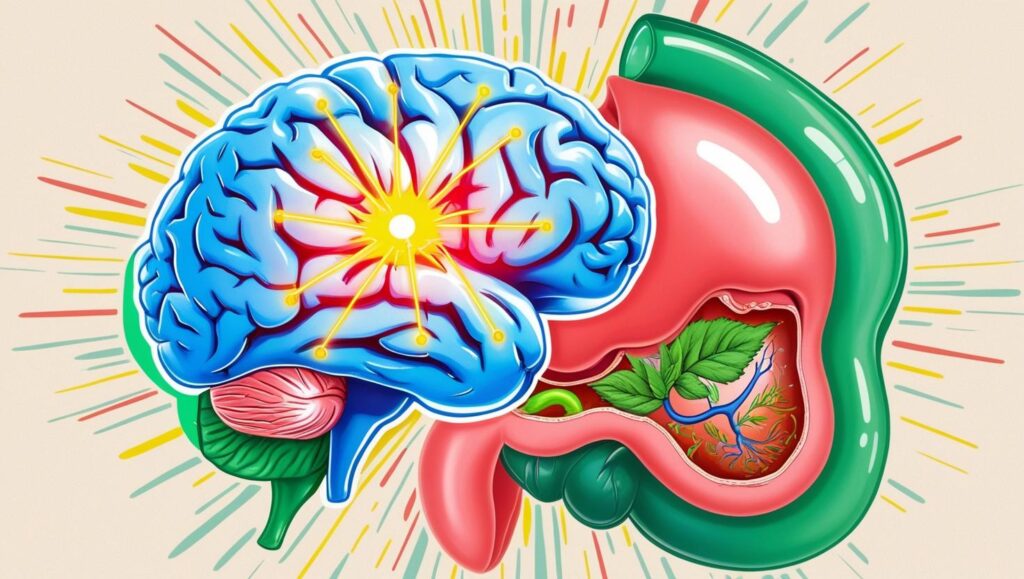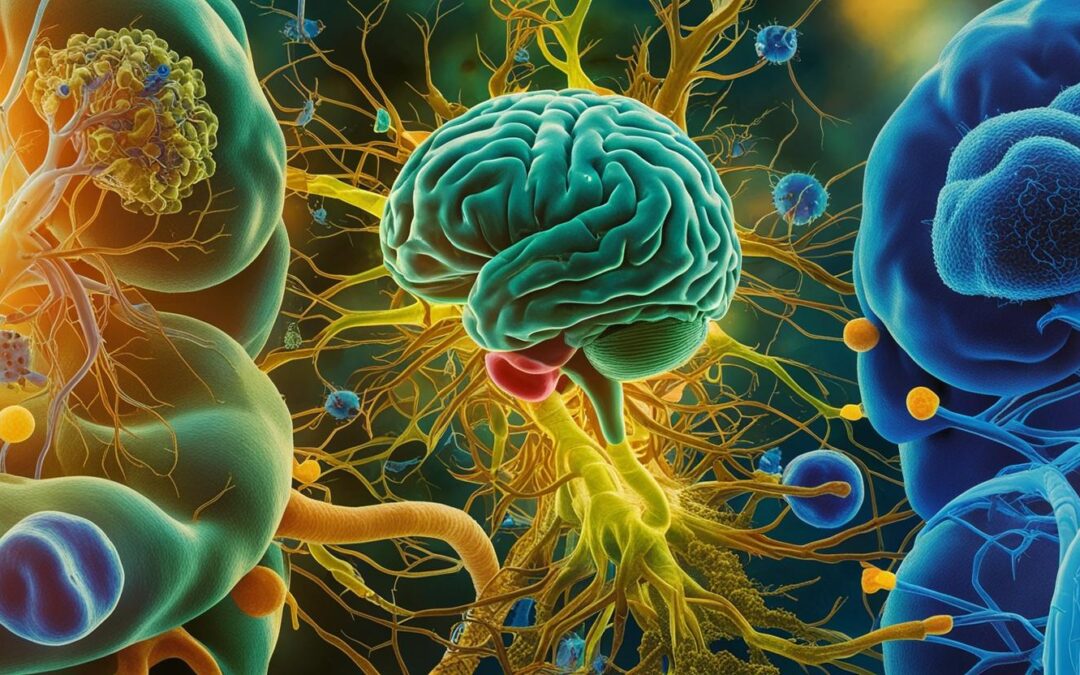Gut-brain axis, an intriguing relationship that links our bellies to our brains! Ever consider how what you’re eating could be directly impacting your mood, anxiety levels, or mental clarity? Suddenly, your gut health transcends from being merely about digestive comfort to a pivotal determinant of your mental well-being! 😮
We’re diving deep into this fascinating realm, exploring how the state of your gut could influence your psychology and discussing how probiotics and prebiotics can bring about remarkable improvements in your mood and cognitive function. So get ready to unriddle the mystery of the gut-brain axis, because a healthier, happier you could be a few good bacteria away! 😉 Your gut will thank you, and so will your mind! 🧠✨
Understanding the Gut-Brain Axis
As we unravel the science behind the intricate dance between our gut and mind, the term “Gut-Brain Axis” has become an increasingly common thread of research. This bi-directional communication circuit connects the stomach and the brain, bidirectionally linking the central nervous system to the digestive tract.
Communication Pathways between Gut and Brain
The Gut-Brain Axis shapes our health and well-being in profound ways. It communicates through two key pathways: the Vagus Nerve and Gut Microbiota, which strongly influence mental health.
Role of the Vagus Nerve
The Vagus Nerve is the longest cranial nerve, running from the brain to the abdomen. It plays a pivotal role in signaling the brain about the state of the gut. For example, if your stomach is upset, the Vagus Nerve sends this information to your brain, which may result in feelings of nausea or discomfort. This same pathway also allows the brain to send signals to the gut, which can influence digestion and possibly the activity of the gut microbiota.
Influence of Gut Microbiota
The Gut Microbiota, a vibrant community of trillions of microorganisms residing in our digestive system, is the second key player in this communication. The microbiota produces numerous neuroactive substances and hormones, impacting the brain’s functioning. Variations in the types and numbers of these microorganisms can alter the messages sent to the brain.
Impact of Gut Health on Mental Well-being
The health of your gut can have significant implications for your mental well-being. This is primarily due to the gut’s production of neurotransmitters and the potential role of certain bacteria in mental health disorders.
Gut-Associated Neurotransmitters
An impressive 90% of the body’s serotonin, a neurotransmitter that regulates mood, sleep, and appetite, is produced in the gut. Dysregulation of serotonin production or gut function can directly impact mental well-being. This is a compelling reason why improving gut health could potentially alleviate symptoms of depression and other mental health conditions.
Microbial Inhibition and Depression
Research has highlighted the potential link between gut microbes and mood disorders. Certain types of bacteria, such as Bacteroides species, are less abundant in individuals suffering from depression. This suggests that enhancing gut health and promoting a diverse and balanced gut microbiota may have potential benefits for mental health.
Understanding and nurturing the Gut-Brain Axis through a healthy diet, probiotics, regular exercise, and stress management can go a long way in promoting mental well-being.🙂

Role of Probiotics in Enhancing Mood
The relationship between probiotics and mood is fascinating, and recent research supports the idea that these beneficial bacteria can make a real difference in our mental health. Let’s delve into the details to gain a comprehensive understanding.
Mechanism of Probiotics in Mood Regulation
Probiotics work their magic on mood in myriad ways, focusing on key areas like serotonin production and anxiety levels.
Influence on Serotonin Production
First and foremost, it’s essential to recognize the significant influence probiotics can have on serotonin production. Serotonin, a key neurotransmitter often pronounced as a “happy chemical,” plays a pivotal role in our mood, happiness, and overall mental well-being. It’s phenomenal to note that a vast majority of this serotonin is created in our gut. Probiotics aid in absorbing the essential amino acid tryptophan, a building block of serotonin. By promoting the absorption of tryptophan, probiotics help enhance the production of serotonin, leading to improved mood states.
Impact on Anxiety Levels
The impact of probiotics on anxiety levels is another aspect worth highlighting. Researchers have discovered that certain probiotic strains can assist in reducing symptoms of anxiety. They work by reducing inflammation and oxidative stress in the body, two conditions linked with anxiety disorders. By minimizing these issues, probiotics facilitate a calming effect, contributing to keeping anxiety at bay.
Types of Probiotics for Mental Health
While all probiotics aid in fostering overall health, some specific strains are known for their potent impact on mental well-being.
Bifidobacterium Strains
Among these, the Bifidobacterium strains, particularly Bifidobacterium longum and Bifidobacterium breve, are of special note. Researchers have found links between these strains and lowered levels of psychological distress and depression. They also assist in normalizing the levels of cortisol, a stress hormone, thus enhancing mood and cognitive function.
Lactobacillus Strains
Likewise, certain Lactobacillus strains, such as Lactobacillus helveticus and Lactobacillus rhamnosus, are becoming renowned for their mental health benefits. Apart from improving mood, these strains are proven to reduce cortisol levels and effectively lower stress and anxiety, thereby promoting mental wellness. They are also helpful in promoting sound sleep, which further contributes to better mental health.
Probiotics contribute to improved gut health and, as noted, can have significant benefits for emotional well-being. It’s time to start considering these friendly bacteria as part of your mood-boosting regimen! 👍
Benefits of Prebiotics for Cognitive Function
The benefits of prebiotics extend beyond gut health; interestingly, they also hold significance for cognitive function. Many people inquire about the connection between what we eat and how we think. An optimal understanding of this is appreciated by examining how prebiotics support brain health and the best sources of prebiotics.
How Prebiotics Support Brain Health
Promotion of Beneficial Gut Microbes
Prebiotics, by definition, are types of dietary fiber that feed the friendly bacteria in your gut. This process encourages the proliferation of beneficial gut microbes. These microbes, in turn, produce biochemicals that influence the brain’s function.
Studies have shown that prebiotics can even help boost the production of BDNF- brain-derived neurotrophic factor, a substance essential for brain health. This substance aids in the formation of new neural connections and promotes the survival of existing brain cells, thereby enhancing cognitive function. ✨
Reduction of Inflammation
Chronic inflammation is a modern-day health problem linked to numerous diseases, including cognitive disorders like Alzheimer’s and Parkinson’s. Prebiotics may carry the potential to maintain cognitive health as they play a significant role in reducing inflammation.
Prebiotics stimulate the growth and activity of anti-inflammatory gut bacteria and can curb the production of inflammatory cytokines, which contribute to inflammatory responses in the body. This implies that prebiotics could stay beneficial as we age, preserving our memory and cognitive abilities as they lessen inflammation.
Sources of Prebiotics
Dietary Sources
Many everyday foods are rich in prebiotic fibers. These include underripe bananas, garlic, onions, asparagus, barley, oats, apples, flaxseeds, seaweed, and cocoa. Consuming a variety of these foods will enhance our gut health and contribute to our mental well-being. 🌽🍎
Prebiotic Supplements
While dietary sources are the best way to take prebiotics, supplements can also be an alternative for those who find it challenging to adjust their diet. Prebiotic supplements, namely inulin, fructooligosaccharides (FOS), and galactooligosaccharides (GOS), are readily available in the market. Remember, it’s advisable to consult a healthcare professional before starting any new dietary supplement regime.
Prebiotics, by promoting beneficial gut microbes and reducing inflammation, could support cognitive function. Whether obtained through dietary sources or supplements, they can be essential to a gut-friendly lifestyle that fosters your mental well-being. 🧠✨

Implementing Gut-Friendly Habits
In the gut-brain axis and mental well-being world, implementing gut-friendly habits can go a long way in improving mood and cognitive function. It’s not just about taking probiotics and prebiotics; it’s about making overall lifestyle changes. These changes include dietary modifications and adopting healthier lifestyle practices.
Dietary Changes to Support Gut Health
Incorporating Fermented Foods
One key strategy to support the health of your gut is to incorporate fermented foods into your daily diet. Fermented foods like yogurt, sauerkraut, kefir, and kimchi are rich in beneficial probiotics. These probiotics bolster the levels of good bacteria in the gut, aiding in digestion, boosting the immune system, and enhancing the production of mood-regulating neurotransmitters like serotonin and dopamine.
Balanced Nutrition for Optimal Function
Balanced nutrition is a cornerstone for maintaining overall health, including gut health. A diet rich in fruits, vegetables, whole grains, lean proteins, and healthy fats can enhance the diversity and number of beneficial microbes in the gut. Conversely, a diet high in processed foods and sugary snacks can lead to an imbalance in the gut microbiota, resulting in issues like inflammation and leaky gut, which can negatively impact mental well-being
Lifestyle Adjustments for Mental Well-being
Stress Management Techniques
Chronic stress can wreak havoc on both your mental well-being and gut health. It can alter gut bacteria and trigger inflammation, leading to various physical and mental health problems. Adopting effective stress management techniques, such as mindfulness meditation, deep breathing exercises, yoga, or even just taking a leisurely walk in nature, can promote mental well-being and foster a healthier gut.
Importance of Physical Activity
Regular physical activity is another crucial aspect of maintaining gut health and mental well-being. Research has shown that exercise can enhance the diversity of gut microbes and boost mood-enhancing chemicals in the brain. It also helps keep the digestive system healthy, which is a crucial factor for overall well-being. To reap these benefits, you should include varied forms of exercise in your routine, such as aerobics, strength training, and flexibility exercises.
Remember, the link between gut health and mental well-being is undeniable, and implementing the right diet and lifestyle changes can help you optimize your gut-brain axis for enhanced mood and cognitive function. 💪😊






Did you know that your gut is often referred to as your second brain? This remarkable connection, known as the gut-brain axis, reveals how our digestive health directly influences our mental wellbeing. When your gut is thriving with beneficial bacteria, it releases neurotransmitters like serotonin, which elevates mood and fosters happiness. Conversely, a stressed or unbalanced gut can contribute to anxiety and depression—a reminder that what we eat doesn’t just fill our bellies; it fuels our minds!
Imagine turning your plate into a powerhouse for joy! Incorporating probiotics from yogurt or fermented foods can do wonders for both digestion and brain function. Plus, whole grains and fiber-rich fruits not only keep your intestines happy but also support cognitive clarity. Embracing this mind-gut connection means treating every meal as an opportunity to elevate not just our health but also our happiness—after all, who doesn’t want to feel great in both body and spirit? So let’s mix up some colorful salads or whip up smoothies brimming with good-for-you ingredients; each bite could spark a positive change in how we feel overall!
This is a fascinating read! The gut-brain axis truly highlights how interconnected our body systems are. It’s incredible to think that something as simple as incorporating probiotics and prebiotics into our diet could have such profound effects on mood and cognitive function. The role of serotonin production in the gut was particularly eye-opening! Looking forward to implementing some of these gut-friendly habits.